Books by Robert Ornstein on the Brain, Mind, and Consciousness
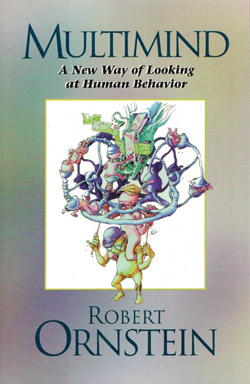
Multimind
A New Way of Looking at Human Behavior
We often hate ourselves for not behaving as we “should”: “Why did I say that? Why did I get so nervous? The author points out that odd situations like these occur because we are not single-minded: the part of ourself that is often judging is independent from the part that is behaving. The illusion is that each of us is somehow unified, with a single coherent purpose and action. But we are not a single person. We are many. This book is about why we have the kind of mental system we do and how it got to be that way, what it is good for, and how it has reached a breaking point in the modern world, a world for which it was not made. With this new understanding and steps to attain a genuine measure of control, we may well be more able to respond to life as it really is.
“If there is one book to read on the nature of the human mind, this is it!” —Paul Ehrlich, Stanford University
“… Ornstein presents, in a most enchanting style, provocative insights into the human mind.” —Donald C. Johanson, author of Lucy
“Ornstein has always been on the frontier of new, speculative thinking about the workings of the mind … No narrow specialist, he uses literature, myth and poetry, not to mention jokes, to illustrate his ideas… Ornstein can describe these ideas so that people without scientific training can grasp them . . . not only informative but entertaining as well.” —Doris Lessing
“…integrates findings from the usually disparate areas of cognition, personality, and the emotions … a persuasive and practical demonstration of the multiplicity of mental phenomena.” —Howard Gardner
“Bob Ornstein’s tour de cortex is smashing—battering barriers between domains of knowledge that have traditionally been isolated because they have been viewed by scholars as unrelated.” —Philip Zimbardo, Emeritus Professor, Stanford University, Founder of The Heroic Imagination Project
“Ornstein is one of the more original thinkers in the fields of neurology and psychology. He has also the advantage of being gifted with the ability to expound difficult ideas simply, as many of the most significant gurus do by means of parables … This is a beautifully written, amusing and provocative book.” —The Guardian
“This is the most exciting psychology book I have read in many years … the first to give a believable approach to how the whole mind may work, not just bits and pieces of it. Psychology is at last coming of age.” —Charles Swencionis, Albert Einstein College of Medicine
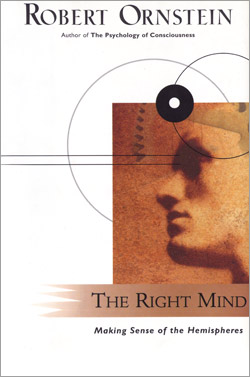
The Right Mind
Making Sense of the Hemispheres
While facts (what we might think of as text) are stored and processed in the left hemisphere, the right mind sets the context and makes sense of it all. Ornstein argues that it is this contextual function that provides the overall framework or overview, and holds the key to our ability to “choose, by a complex process involving all the brain’s power, what we might call ‘the right mind’ for different situations.”
“I have always admired Robert Ornstein’s ability to explain difficult scientific ideas to ordinary people. This book summarizes and elucidates the enormous amount of work that has gone on in this field during the last 20 years since the author was involved with left-brain right-brain research.” —Doris Lessing, British novelist and writer, winner of the Nobel Prize for Literature
“Ornstein’s revisitation of the brain laterality research is astonishing— so much complex evidence brought to life with such a clear, inviting style. This book gives the cutting-edge picture of how the brain works with provocative insights, exciting applications, and glimpses into the future. It will change how you think about the brain. It is in the first rank of books on the brain, and it is also hard to put down. Ornstein at his best!” —Claude M. Steele, author Whistling Vivaldi: How Stereotypes Affect Us and What We Can Do, Stanford University.
“Ornstein takes us on a magical mystery tour through a fascinating mix of evidence from experimental psychology, clinical observation, and even illusionary biology. Certainly, the most intelligently written, readable account of this topic I have come across.” —Gordon Claridge, University of Oxford
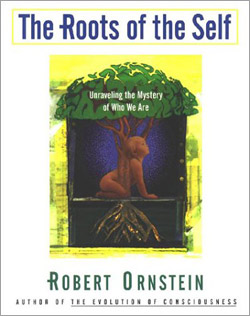
The Roots of Self
People everywhere have created simple and complex systems to attempt to make sense of the riddles of individuality, yet the mystery remains. In Ornstein’s view understanding how impressionable development is, understanding our predispositions and wondrous adaptations, gives us the greatest hope for the future. As the most unfinished of animals, with brains capable of change throughout life, we need this understanding of ourselves and others to make real change possible. Fast, fun, friendly, and with the power to transform the way we see ourselves, this book illuminates the science: the intricate building blocks of genetics that differentiate us, our environment (including family size and birth order) and the foundations of temperament that shape us from womb to grave.
“[Ornstein] uses practical examples, humor and nontechnical language to interpret current findings in psychology … His chapter on race and culture should be required reading for anyone needing evidence that intelligence and achievement are not genetically determined by skin color or ethnic background.”—San Francisco Chronicle Book Review
“A most arresting look at the ‘self’ by one of the most witty and original psychologists writing today.” —Booklist
“Presenting a new personality theory grounded in the latest research on child development, genetics and brain organization, Ornstein challenges many popular assumptions in a brilliant, exciting, conversationally written synthesis.” —Publisher’s Weekly
“Beautifully written … Not self-help but a help to understanding the self … [Ornstein’s] insights are startling, original and certain to change how we think about ourselves and others.” —Paul Eckman, University of California San Francisco, author of Telling Lies and Unmasking the Face
“An intriguing and edifying meditation on how and why we have become the most individuated species.” —Howard Gardner, Harvard University, author of Multiple Intelligences and Creating Minds
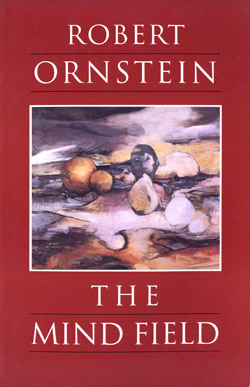
The Mind Field
A Personal Essay
The excesses of the self-improvement packagers have obscured what may be of real value. Meditation may be a valid method for eliminating stress, but are “gurus-of the month” and franchised growth centers the requisites for achieving peace of mind?
How is it that promoters have supplanted real teachers in the realm of consciousness?
The Mind Field takes a rational, scientific look at the esoteric envelope – meditation, Eastern mysticism, psychotherapy, intuition training, parapsychology, and the numerous trademarked “awareness systems.”
No one is better qualified to assess our modern approach to matters of the mind and Ornstein does so with deft reasoning and rock-solid information.
“Works with cool logic and scientific skepticism to point up the potential of intuitional, inductive, and holistic modes of thought, while separating out the voguish chaff.” —The New York Times
“For genuine enquirers this book is a must!” —Doris Lessing, British novelist and writer, winner of the Nobel Prize for Literature
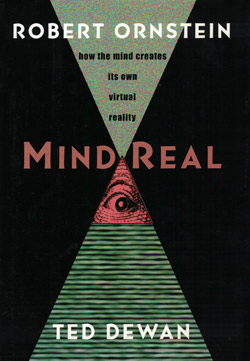
Mind Real
How the Mind Creates its Own Virtual Reality
With Ted Dewan
This book shows one of the most startling findings of modern science: We don’t experience the world as it is, but as a virtual reality. This fact is a critical meeting point for students of the mind, brain, philosophy, and religion. Not an abstruse treatise, it is part brilliant graphic novel and part novel psychological essay that makes accessible the latest findings of science and ancient insights into human nature.
“An excellent read for those who have read Ornstein … for those who haven’t, an excellent introduction to his work.” —Charlie Swencionis, Albert Einstein College of Medicine
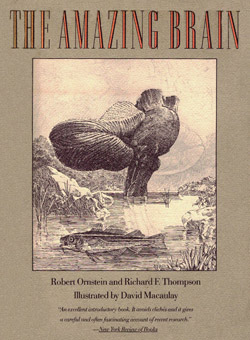
The Amazing Brain
With Richard F. Thompson
With its stunning illustrations by world-renown illustrator David MacCaulay, this book continues to provide an accessible primer on the object responsible for everything from our most primitive behaviors to the creation of civilization – its construction, electrical and chemical processes, and “ramshackle” evolution over millions of years.
“The clarity they offer is enhanced by the wonderfully detailed illustrations of David MacCaulay that take us to the surreal landscape of the interior of the brain.” —San Francisco Chronicle
“Fascinating study of the human brain. While the text is accessible . . . it is the illustrations that separate this book from others.” —Library Journal
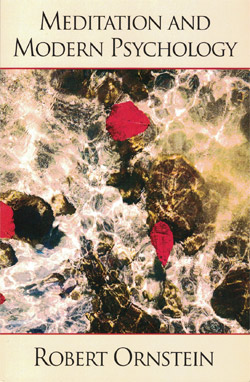
Meditation and Modern Psychology
This update to the 1971 On the Psychology of Meditation by Claudio Naranjo and Robert Ornstein examines meditation from the perspectives of religions and philosophies such as Zen, Yoga, the Sufis and Christian mystics, and from the modern psychologist’s point of view – what is happening neurophysiologically and what is the resulting experience? This modern scientific view is sympathetic to the practice of meditation as a tool which, under the right direction, can leads to a different mode of perception.
“This book is thoroughly worth buying and reading – with a pencil. We desperately need what the book is talking about and showing to be a real possibility. We can no longer ignore the impressive testimony to the nature of consciousness that is coming from a convergence of the mentalities of the east and the west. The freeing of consciousness is the most urgent need about time.” —Sebastian Moore, The Critic
“This book is the first scientific treatment of meditation that is really good. If you are a meditator and want your worldview expanded, this will help. If you’re a scientist and want your worldview expanded this, will do it.” —Charles T. Tart, The Last Whole Earth Catalog

On the Experience of Time
How do we experience time? What do we use to experience it? As a young graduate student Robert Ornstein showed In a series of remarkable experiments that it is difficult to maintain an “inner clock” explanation of the experience of time. He postulated a cognitive, information-processing approach that alone makes sense out of the very different data of the experience of time and, in particular, of the experience of duration – the lengthening of duration under LSD, for example, or the effects of an experience felt to be a success rather than a failure, time in sensory deprivation, the time-order effect, or the influence of a sedative or stimulant drug.
See All of Robert Ornstein’s Books
Praise for Books by Robert Ornstein


